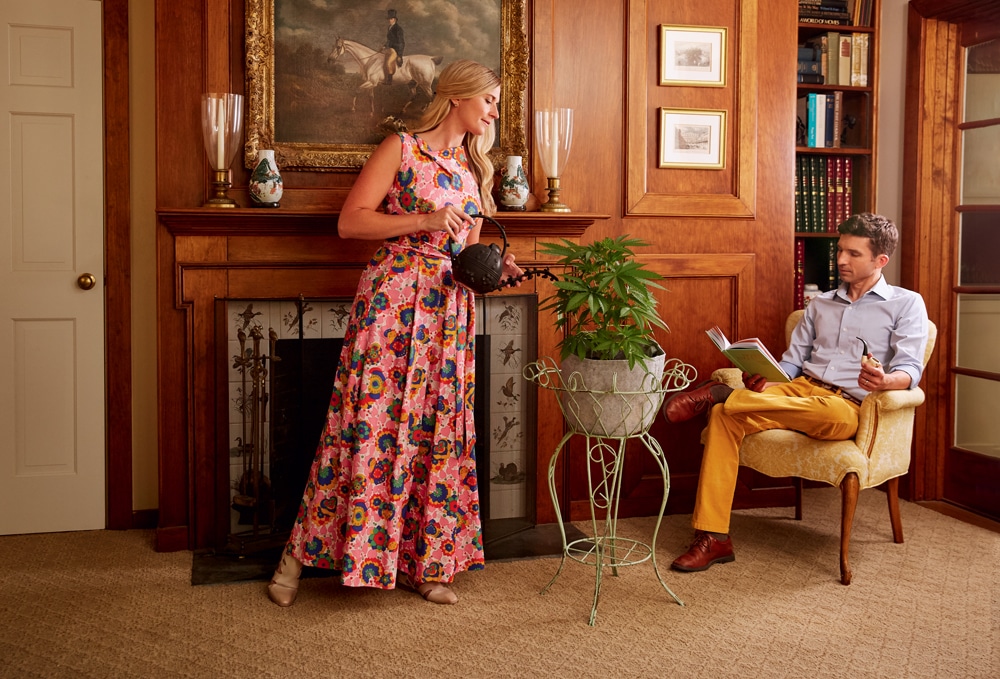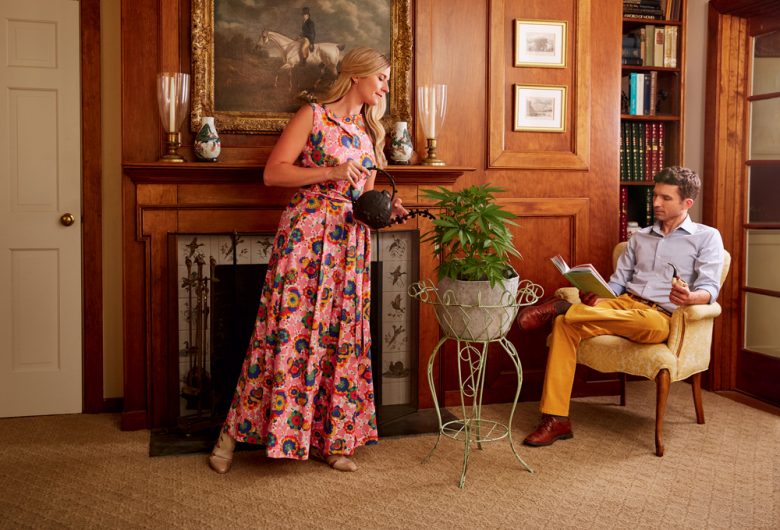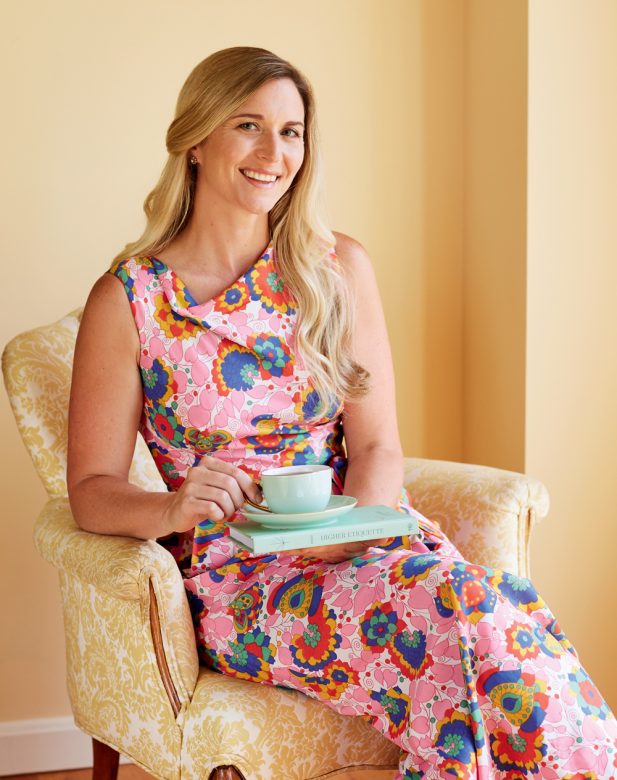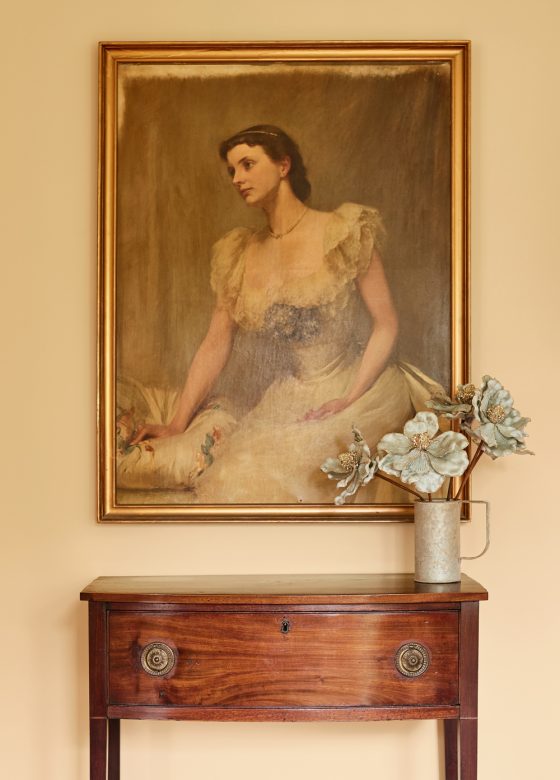Lizzie Post Would Like Your Attention. Please.
A new generation is carrying on Emily Post’s crusade to teach politeness and manners, at a time when both seem to be sorely lacking.

Lizzie Post (whose most recent book on manners deals with marijuana dos and don’ts) poses with her cousin and fellow etiquette adviser, Daniel Post Senning, as models of modern decorum.
Photo Credit : Steph Larsen; styling by Chloe Barcelou; hair & makeup by Vivian E. InfantinoIt’s intimidating meeting Lizzie Post. Descended from America’s most prominent authority on etiquette, Post has inherited the nearly century-old family business of teaching others how to be considerate and courteous, which she co-runs mostly from a desk in the front room of her house in Burlington, Vermont, that has a designated drawer for stationery and note cards.
Arranging a visit with her entails worrying about and toiling over the appropriate number and placements of “please”s and “thank you”s. There is angst about arriving on time. The handshake must be firm; the gaze, met. Is it disrespectful to decline a cup of the tea that’s steeping in a pot in the kitchen? Navigating this experience feels perilous, so all-consuming seem the expectations.
“Try being me,” says Post.
Upon Post and a cousin, Daniel Post Senning, has fallen the responsibility for continuing the considerable legacy of their great-great-grandmother Emily Post, whose 1922 book Etiquette in Society, in Business, in Politics, and at Home made her the nation’s arbiter of good behavior.
It’s a heavy burden in an era of unprecedented incivility and singularly awful manners at the highest levels of leadership, at a time when people cloister themselves behind earbuds and screens and natter loudly on their phones at restaurants and checkout counters. When the #MeToo movement has exposed the breadth of classless conduct, and cable news debates the candor of apologies and the prospects for forgiveness. When ghosting is a thing, deferential driving has swerved into road rage, the rudest confrontations on reality TV get the highest ratings, and swiping left is an evasive substitute—anonymous and without consequence—for saying “No, thank you.”
Photo Credit : Steph Larsen; styling by Chloe Barcelou; hair & makeup by Vivian E. Infantino
“People wear pajamas on airplanes,” Post says, clearing a space on a couch without disturbing the cat perched on an armrest. On the shelf across the room is an ancient edition of her ancestor’s seminal work, which she and Senning reverentially call The Book. People “don’t wear black even to funerals, never mind for long periods of mourning.”
She isn’t judging these things, necessarily. Post is nothing if not diplomatic. “I have to be,” she says of this age when seemingly anyone with an opinion risks attack. “You know what happens when I’m not? My inbox blows up.” This despite the fact that, as Emily Post herself said, “Etiquette requires the presumption of good until the contrary is proved.”
Instead, Post and Senning preach that etiquette is not a list of rules. It’s about being aware of how behavior is affecting other people. “If you have that awareness,” Emily Post proclaimed, “you have good manners, no matter what fork you use.”
At a time when the word “etiquette” seems old-fashioned—some other experts avoid it altogether, preferring euphemisms like “relational capital” or “interpersonal skills”—this is a message that today’s Posts share in new ways.
Among their jobs is to continually revise The Book, now in its 19th edition (a 20th is planned for the 100th anniversary, three years from now). They’ve updated it to address such topics as texting (the same guidelines should apply as for a spoken conversation, meaning that it’s rude to ghost), friend requests (those, it’s OK to ignore), and online dating (give up and move on after two messages in a row go unreturned).
They host a podcast, Awesome Etiquette, and a Twitter feed, and teach business etiquette online using PowerPoint presentations with an updated logo incorporating Emily Post’s distinctive signature. It’s still a powerful brand. “There are true believers,” Lizzie Post says. “But there are also tons of people who stumble across us and they have no idea that we’ve been around for 100 years. They just want some help.”
Post and Senning’s Emily Post Institute has spun off new how-to books, including Manners in a Digital World by Senning. The newest, just out: Post’s Higher Etiquette: A Guide to the World of Cannabis, from Dispensaries to Dinner Parties.
The duo also personally dispel the stereotype exemplified by the black-and-white photograph that hangs on the exposed-brick wall of their shared office in a converted schoolhouse downtown: Emily Post speaking on a radio program in a hat and pearls.
“People definitely picture a matronly, maternal, grandmotherly figure dispensing this advice,” says Senning, a fashionably dressed and youthful 41-year-old former dancer with a degree in molecular biology. His cousin, 36, favors denim and sunglasses pushed up over her long blond hair, grows marijuana in her house (it’s legal in Vermont), and turns out to be less intimidating than feared, except when she bristles at overly broad questions (“Is the social compact broken?”) that she says aren’t for her to answer. Her Jeep needs a wash, and as she prepares to lead the way to the downtown office, she apologizes for the pile of cardboard in the driveway awaiting the recycling pickup.
“We are exactly what you see here: an average family,” Post says. “None of my friends wear pearls.” And Burlington, she says, “is not Park Avenue.” Adds Senning: “I’d be hard-pressed to find a black-tie event in Vermont that’s not a wedding. Although don’t get me wrong, I love an excuse to put on my tux.”
Photo Credit : Steph Larsen; styling by Chloe Barcelou; hair & makeup by Vivian E. Infantino
That this dressed-down New England town became the home to an institute identified with honesty, respect, and consideration—the underlying principles of their work, the Posts say, to which they sometimes add kindness—is mostly a coincidence; several members of the past few generations moved here from New York. But Emily Post was descended on her mother’s side from John and Priscilla Alden, who arrived in Plymouth on the Mayflower, and beginning in her girlhood she summered in Bar Harbor, Newport, the Berkshires, and Martha’s Vineyard. She had deep New England roots. And so does etiquette.
Part of that is due to the area’s long history and close ties to the European cultures that colonized it. Though she lived mostly in New York while working as a writer, Emily Post observed that New Yorkers’ manners “are often condemned and often very deservedly,” while Boston society “preserved a quality of unmistakable cultivation.”
Meanwhile, the small size and challenging climates of communities such as Burlington demand that neighbors help each other out. It’s the kind of place where a local at a restaurant slides a menu over to a new arrival with a nod but not a conversation or, for that matter, a “hello.” Where other drivers gesture for Post’s Jeep to pull in when construction narrows a road to one lane. Where Post notices during a phone conversation that a neighbor has come, unasked, to plow her driveway. “Oh, I’ll have to bake him something,” she thinks out loud.
This city, where she was born and raised, says Post, “certainly fits our brand because it fits our family. People in this area are really nice.” When she writes about etiquette, she says, “I want it to feel like Burlington. I want it to feel friendly and welcoming and like a space you want to be in.”
Appearances notwithstanding, Americans do want to be in this kind of a space, say Post and Senning. The etiquette industry nationwide is booming, driven largely by a recognition that success in business in particular and life in general depends on practicing those principles of honesty, consideration, and respect—even if some politicians and celebrities seem to have rejected them. “People are saying, ‘I don’t want that. That’s not OK,’” says Post. “You get people saying, ‘We need to be nicer to each other. We have to take care of each other.’ And that’s why there’s hope.”
———
If there’s one thing Americans can agree about in a divisive time, it’s that the country is suffering a civility deficit. That’s the consensus of 93 percent of people surveyed by the Boston PR firm Weber Shandwick. Nearly seven in 10 consider incivility a major problem, and eight in 10 experience it personally—most commonly while driving (39 percent), shopping (39 percent), and on social media (38 percent). The frequency of rude encounters, in person or online, has nearly doubled since 2016, from six times a week to about 11.
What contemporary critics sometimes overlook, the Post descendants and others point out, is that something similar was happening when Emily Post sat down to write The Book. “In the 1920s, there was sort of a simmering, quiet war between new and old money,” Senning says. “It’s not an issue that’s unique to our time.”
There was worry that such cutting-edge advances as radio and the widespread adoption of the telephone would cut people off from one another, for example, and from the rules that governed how to act in public. “You heard back in Emily’s day, once telephones started to appear in people’s homes, that this was the end of family life as we know it—nobody is ever again going to sit down to a family dinner,” Senning says. Even Emily Post wondered “whether etiquette may not soon be a subject for an obituary rather than a guide-book.” Jazz Age decadence and the frenzy of finance threatened to drown out the quiet decorum of the formal dinner party.
“We do live in a complicated time; that’s straight-up true,” Lizzie Post says, testy after being pressed a few times too many on this point. “But every generation has had complicated times. Every single generation thinks the generations before were more polite.”
Born to an architect father who designed, among other things, New England summer “cottages” of the elite, Emily Post went to finishing school in the Manhattan of the Astors and the Vanderbilts. Divorced from her philandering banker husband, and with her own sons grown, she took up writing. She had produced five novels when Vanity Fair editor Frank Crowninshield of the blue-blooded Boston Crowninshields suggested at a dinner party that she write about etiquette. She spread out on her late father’s drafting table and set to work.
The result, with its distinctive blue cover, joined a crowded field of books on the same topic. But none “left any more than a thumbprint on American behavior until Emily Post came along,” gushed culinary historian Esther Bradford Aresty. It was an instant hit, as much for the glimpse that it provided behind the damask curtains of the wealthy and wellborn as for the advice about luncheons, teas, formal dinners, balls, when a chaperone was needed, how to write a letter of recommendation for a servant, how much to tip the steward on a transatlantic steamer, and what to wear when riding.
“Do not attract attention to yourself in public. This is one of the fundamental rules of good breeding,” Emily Post wrote. When shaking hands, “there should be a feeling of strength and warmth in the clasp.” “The bride who is happy in receiving a great number of presents spends every spare moment in writing her notes of thanks, which must always be written by her personally.”
Jodi R.R. Smith, president of the etiquette consulting firm Mannersmith, on Boston’s North Shore, has Emily Post’s book on her shelf, too, alongside similar works by Amy Vanderbilt, Letitia Baldridge, and Judith Martin. Their influence was vast, says Smith—and holds another timeless lesson. “What these women did, and it was almost exclusively women, was they were looking for a way to equalize our very divided society. And one of the ways we equalize a divided society is by treating people well.”

Photo Credit : Steph Larsen
It was Emily Post’s name that became the most synonymous with good behavior. That led to an even larger role for her as a radio personality and syndicated columnist. She wrote a cookbook featuring such dishes as mint jelly and wet hash (Lizzie Post has her great-great-grandmother’s personal copy, taped together at the binding and with a curt warning handwritten by its author on the inside front cover: “This book is not to be taken away”). And she incorporated what was originally called the Emily Post Institute for the Study of Gracious Living so her descendants could continue her crusade.
They also have had to live up to her standards—not because the family required it, but because everybody else did. “It wasn’t put on us by our family at all,” says Post. “I felt going to the other side of my family, I needed to be more careful than with my Post side.” At only 12, at a sleepover, she was admonished for sipping from her glass of milk before saying grace. “My friend’s dad said, ‘What are you doing? You’re Emily Post’s great-great-granddaughter!’ I was shattered.” Even now, she’s held to higher expectations. When she missed a business meeting, Post says, “the first words out of the person’s mouth were, ‘Oh my God, I can’t believe Emily Post’s great-great-granddaughter ghosted me!’” (Such remarks are impolite, Post notes.)
Born and raised in Burlington, Post studied art education at the University of Vermont—some of the colorful acrylic collages she makes hang in her house—and after graduation she worked selling men’s suits before going into the family business. “It was never something we had to do,” she says. “But when you’re wondering what you’re going to do and someone offers for you to be an author, you say yes.” Senning joined her after trying his hand at a career as a performer in California, where he’d gone to college.
And so the Emily Post Institute settled in to continue its work from Vermont.
———Well before Emily Post, there was a whole New England industry of etiquette manuals and guidebooks. “There’s such a tradition of this here,” says David Watters, director of the Center for New England Culture at the University of New Hampshire. “There was attention to manners from the get-go.” Preached New Englander Ralph Waldo Emerson: “Life is short, but there is always time enough for courtesy.”
Those manners were of a very special kind, however. Behind the courtesy that Emerson encouraged, New Englanders have always been standoffish. “There is a guardedness, and some of it goes back to Puritan times,” says Watters, who also is coeditor of The Encyclopedia of New England. Good fences, in New England, make good neighbors, as the New Hampshire poet Robert Frost famously noted. “New Englanders are notoriously reserved,” no less of an authority than the Lonely Planet guide warns visitors. “Do not expect strangers to greet you or strike up a conversation.”
Emily Post observed this too. Some Boston clubs, she wrote, “have earned a reputation for snobbishness because the members never speak to those they do not know.” Yet she also wrote admiringly that “Boston hostesses of position have never failed to demand of those who would remain on their lists strict obedience to the tenets of ceremonies and dignified behavior; nor ceased themselves to cultivate something of the ‘grand manner’ that should be the birthright of every thoroughbred lady and gentleman.”
Despite the kinetic nature of society that has diluted regional identity, New Englanders still follow this distinctive set of rules, says Smith, the author of The Etiquette Book: A Complete Guide to Modern Manners. “Live and let live. Don’t tread on me. You do what you want to do in your house, and I’ll do what I want to do in my house. We’re so polite we don’t want to be in anybody else’s business.”
It’s in business that the Posts and the rest of the etiquette industry are finding new importance and their next frontier.
———
Among the other topics that invite a chill from Lizzie Post is how Americans have come to lose their manners. It’s a question based on too broad of an assumption, she says. Everyone is not unmannered always. Senning agrees. “Etiquette becomes much less useful when you’re using it to judge other people,” he says.
But some explanations for the state of incivility emerge from conversations with the Posts and others. Reality TV. Technology. “It’s very easy for our communication to become inconsiderate,” says Post, whose own pet peeve is when someone stops responding to a chain of texts. Online, “people think that that illusion of anonymity frees them from social constraint,” says Senning.
Life has also sped up. Helicopter parents overschedule their children, who linger in extended adolescence. “There was a time when people learned manners and etiquette and proper behavior and values, and they learned these things at home,” says Lydia Ramsey, an etiquette coach and author of Lydia Ramsey’s Little Book of Table Manners. “Now you have both parents working and no time for everybody to sit down and eat together. The last thing they’re paying attention to is manners.”
It’s also true that sensitivities are heightened. Thanks in part to #MeToo, “people are just now becoming aware that hugging isn’t something everybody likes,” says Post. Her professional advice? “I would tell that person, ‘Please don’t. You really could make someone very uncomfortable.’” (Here Emily Post seems prescient. “‘Keep your hands to yourself!’ might almost be put at the head of the first chapter of every book on etiquette,” she wrote.) But polarized politics also makes the way that people talk to one another now about such things as rights and race “incredibly fraught,” says Lizzie Post.
Role models, too, have gotten scarce. Nearly 70 percent of Americans of both parties, in an Associated Press poll during the 2016 presidential race, said the candidates were not examples of the highest standards of diplomacy or tact, but in fact outdid the general public in their levels of vulgarity and rudeness. “What we’re living in now is just so shrill,” says Crystal Rockwood, who builds and repairs reputations as a specialist in crisis public relations after having taken the Emily Post Institute’s business training course. (“Talk about being intimidated! But after I did it, I realized these are the kinds of people who make you feel so comfortable.”)
Americans’ perceptions of their own politeness are extraordinarily subjective, however. Other polls have shown that most people say they always wave when other drivers let them into traffic, for example, but hardly anybody waves to them when they do it—a mathematical impossibility. It’s what Post refers to as the RSVP conundrum: A guest is as unhurried about returning that RSVP as the host is desperate to receive it. (Her advice in this case: It’s OK for the host to call with a reminder.)
Even she laughs, Post says, when she remembers instances when someone has been rude to her. “I try to think, have I done the same thing to them?”
On the whole, however, Americans still hugely value the standards that etiquette defines. Eight in 10 believe civility is good for the country and helps narrow divisions, according to the Weber Shandwick poll. More than 70 percent are optimistic that the future will be more collegial. And more than 40 percent agree on one way to achieve that: by teaching civility at work.
———
A few blocks from the institute, at the University of Vermont’s Grossman School of Business, faculty began to notice earlier this decade that arriving students struggled to connect with others. “They have the technical skills and know how to interact in a classroom setting but not how to introduce themselves to someone, how to act at a networking event, how to act at a cocktail party, what to wear to a job interview,” says Barbara Arel, associate dean. “They’re so inside their screens that to actually communicate with someone—they’ve never learned that.”
So the business school debuted a required course in professional development. Then it added two more. They cover topics such as how to dress for success, talk to a recruiter, get a job—even how to shake hands. (Emily Post: “Who does not dislike a ‘boneless’ hand extended as though it were a spray of sea-weed?”)
“We’ve seen the need for these skills to be taught,” says Arel. “We know our students won’t succeed professionally without them.” When students in other majors come to business school events, she cringes at the hoodies they wear and the mad dashes for the free food. “They don’t realize how important these things are to them until they get out.”
That’s a major reason etiquette is back: because it offers a competitive advantage. “Good manners are a differentiator,” Smith says. Or as Emily Post put it, “A fundamental knowledge of etiquette is no less an asset in business or public life, or in any other contact with people, than it is in society.”
Business types don’t actually call this etiquette. They call it customer service, civility, or communication skills. Whatever it’s called, there’s more demand for it than ever. The Posts have conducted business etiquette seminars for companies including Emirates Airline, Le Méridien Hotels, Barclays Financial, UBS, and Geico. “People in the business world understand how much the way their employees act translates to the bottom line,” says Post. “Imagine those mixers, those let’s-grab-a-drink-after-work events—all of those are places where you can mess up and lose the business.”
It’s not just in the business world that growing awareness of the lack of good behavior seems to be creating a demand for more of it. Some 1.3 million videos were uploaded to YouTube in the past year alone with “etiquette” in their titles. One of the most debated questions on the Awesome Etiquettepodcast was about an incident in which a group of friends spent three hours agreeing on the toppings for a pizza. (It’s not helpful to say, “I don’t care,” which just prolongs the indecision, the Posts advised.) There is a lot of interest these days in apologies (“How about ‘I’m sorry that I made you uncomfortable’—not ‘if I made you,’” Lizzie Post says) and forgiveness (“We so need to recognize that we’re all human”). The new book about cannabis etiquette exposes a demand for advice about how to handle entirely new kinds of social situations (ask before lighting up whether anybody minds the smoke, wipe the mouthpiece before passing the vape pen).
It’s much like karma, Smith says. “If you’re polite to the postal worker and the bus driver and you make eye contact with the person handing you your cup of coffee, you’re going to find that that’s reflected back to you. If you start yelling at the car that cut you off in traffic, you’re going to go down the vicious cycle.”
Smith is optimistic. “We do have lots of opportunities to be nicer and more polite to each other. But look more closely: For every person who double-parks, you see another person holding the door open for somebody with a stroller.”
Post thinks so too. “I’m hopeful, because every single day somebody does something nice,” she says, before saying good-bye in the parking lot of the institute’s office with a firm handshake and steady eye contact. “Good things happen every day. Be grateful for them. Write them down. That’s a really good way to see that there’s still a place for etiquette in the world.”
After all, as Emily Post said: “Consideration for the rights and feelings of others is not merely a rule for behavior in public but the very foundation upon which social life is built.”


